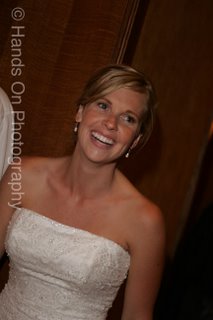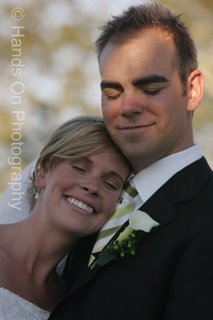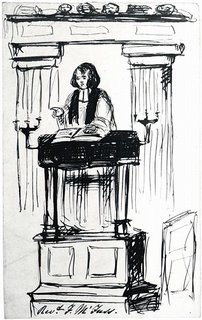 Mark was a well respected up and coming leader in his denomination. He had come from a long line of pastors and was finally hitting his stride as a leader in his own right.
Mark was a well respected up and coming leader in his denomination. He had come from a long line of pastors and was finally hitting his stride as a leader in his own right.
His grandfather had been head of the denomination. His dad had risen through the ranks to to the same position as well. The family was a bit of an icon, as their reputation for godly leadership, was well known throughout the country.
Mark was pastoring a rapidly growing congregation. This past year he too had been asked to step into a national leadership role by the denomination. It was a role that set him up for massive influence and huge possibilities. Everything he dreamed of was coming to pass. The third generation was now stepping up to wear the mantle of leadership that had been the heritage of a great Godly family.
Then it happened. Seemingly out of nowhere.What began as a honest compassionate act of pastoral ministry would viciously ravage Mark's whole world in a matter of weeks.
Mark's world came crashing to the ground as violently and publicly as the World Trade Centers while all around him watched in pain and disbelief.
Unmet needs and lack of safe boundaries turned a counseling relationship into a seductive trap. Destruction wreaked havoc and pain not only Mark's life and the woman he was counseling, but also both their families, his church, and the denomination that had just placed so much trust in him as a leader.
In the ensuing turmoil and torment Mark lost everything. His beloved wife, his kids, the respect of the church and the denomination. Everything gone!
Like an octopus, tentacles of shame began to strangle and squeeze every ounce of life from Mark's existence.
"How could this have happened? What have I done? Why did I sacrifice my family... and for what? How could I have destroyed the reputation of my family and the legacy of my father and grandfather? This cannot be happening to me. How could I have destroyed everything I have dreamed and prayed for?"
The accusatory questions reverberated through his mind and heart in a self and guilt imposed Inquisition that had no end. In contrast to his own self-damnation and self-hatred, there were a few good brothers who did try to reach out to Mark with healing compassion and forgiveness. But as the weeks and months passed Mark continued in a downward spiral of destructive guilt.
Deep waves of shame that continually washed over him would not allow him to face friends, family, church members or others in the denomination that he had let down in his failed leadership. More than that, Mark could not face God. Instead he walled off every entrance and exit to his being from anything that would lead to a face to face encounter with God. Certainly God wanted nothing to do with him after what he had done.
At last the pain of failure was so great that Mark could stand it no longer. He despised his very existence. The loss of all that he loved and held dear was too acute to live with anymore.
In the dark recesses of his mind he determined it. He planned it. He would end his life.

The white line of the highway became a dull blur as he made his way up the mountain road. In a mental and emotional fog, he found himself high in the mountains with nothing but the clothes on his back and a gun. The very gun he had often used on frequent hunting trips to those very same mountains.
Distant and now painful recollections of wonderful and magical times hunting with His father, welled up inside him as he trudged through the fresh fallen snow. He passed the all too familiar landmarks of his childhood. Memories of times with his dad and the countless hours they spent hunting, reeled through his mind like recollections of a paradise lost.
Uncontrollable sobs issued from the core of Mark's being as he pondered the shame and the hurt he must have created in the heart of his father. He had so idolized and loved his dad growing up. He so wanted to be like his father. All his life there was no one he more wanted to emulate and be like in his lifetime. Now he had shamed and brought disgrace to the very one he so wanted to make so proud.
The pain was too much to bear. "How could he have become such a loser? How could such subtle pride and undetected arrogance from his success have left him open to such a fall? How could he have been so busy about the things of God that he was unaware of the huge needs for intimacy with God and his wife he had left unmet? Those very deficits emotionally had become the seeds of his destruction.
He knew all that! He had preached on that so many times!
"What a fool! What a fool!" The voice of condemnation echoed over and over again through the corridors of his mind. The shouts of indictment increased in intensity with every step he took through the powdery snow.
The moon began to cast a dull glow as the partially cloudy sky darkened the path in front of him. Soon the beauty of the surroundings became barely distinguishable silhouettes. Much like the dull images that met his eyes, Mark's despair cast a eerie fog over memories that used to be so real. Vivid pictures of the things that were so dear to him, were now barely distinguishable silhouettes of things that once were but were no more.
Somewhere in the dark of the night Mark lost the will to live. He was ready to end it all.
As he resigned himself to pull the trigger a yearning to hear his wife's voice one more time made him pause. A strange prompting to listen to her voice mail on his cell phone he had saved and listened to so many times before made him stop. He climbed to an outcropping of rocks and amazingly he saw one bar as he opened his cell phone. The ring signaled the connection.
What happened next shocked Mark at the core of his being. "You have two new messages," the polite and businesslike voice said at the prompt.
Mark pushed the star key and punched in his password.
"Mark, it's dad," the familiar voice said. Just the sound of his gracious voice brought a rush of emotion to Mark's heart.
"Mark, I know you don't want to see anyone son, but I want you to know how much I love you."
The next words, and the sound of the wind whistling behind his father's voice on the recording, confirmed what Mark instantly knew in his spirit.

"Mark, I am on the mountain son, and I am looking for you. I know you know this mountain like the back of your hand and that if you do not want me to find you I won't find you easily. But I want you to know I am looking for you son. I am going to stay up here on this mountain until I find you Mark.
I love you son and nothing you have done can change that or my love for you."
The emotions began to flow uncontrollably. As Mark heard his earthly father's voice, he also miraculously heard and saw the face of of his Heavenly Father saying to Him, "Mark, I love you son. I am up on the mountain looking for you. If you don't want me to find you, I know you can hide, but I am looking for you and I am not leaving until I find you."
Almost instantly weeks and months of self-hatred and hopelessness, gave way in Mark's heart, to the torrent of God's furious love and forgiveness. But God was not finished with his work of redemption and reconciliation.
As Mark's mind and heart spun with feelings of love and acceptance he had long lost hope of ever feeling again in this life, the voice mail clicked over to the next message in the queue. It was Mark's wife Mary. Not the old message he had saved and listened to again and again, just to hear her voice. A new message was there, sent just after the one from his father.
"Mark, it's Mary... A long pause ensued and then her quiet voice half crying and half talking spoke again.
"Mark, I want you to know how much you have hurt me and the kids. It has not been easy for us and I have been angry with you. I know you are hurting too. I know I told you I want a divorce ... but Mark I want you to know that I forgive you and I want to start over.
I chose you when I married you Mark, and today I want you to know that I am re-choosing you again. Please call me and come home. We can rebuild. I need you and the children need you."
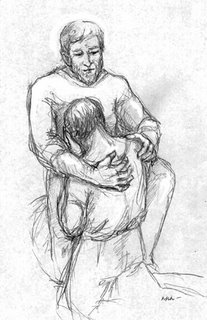
What followed on the mountain that day between Mark and his dad is a picture that was only beheld in the heavenlies.
A lost son was saved and reconciled to a father in a sacred scene that I am sure made the angelic host cry, and a Heavenly Father experience unspeakable and indescribable joy.
Do you know that the Father Heart of God seeks after you relentlessly? His pursuit of you knows no end and has no bounds.
Do you know that there is nothing in the hidden recesses of your secret life that God is not aware of? Others may not be aware of the things that plague your spirit and vex you with a sense of worthlessness and self-hatred, but God knows it all intimately.
He would say to you today, "I know if you don't want me to find you there are a lot of places you can hide. You can make it difficult to find you. But I want you to know I am tirelessly looking for you and I am not going to quit until I find you.
I love you and I died for those ugly things you keep hidden in the round tower of your heart. You need not be held captive by them anymore. I want to make your life new. I want you to bask in my forgiveness and love. I want you to know how much you are worth to me.
Come home son. Come home daughter. It will bring me unspeakable joy if you will accept my love and let me lavish you with my grace and care.
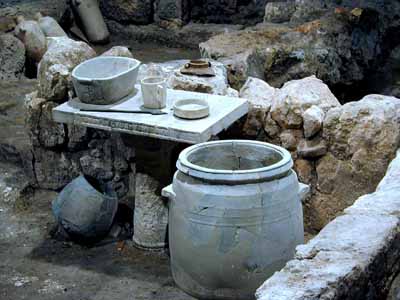
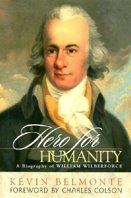
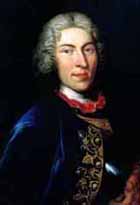
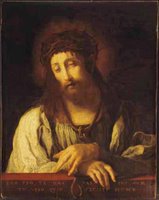
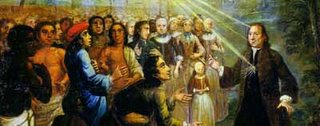 Zinzendorf himself visited St. Thomas, and later visited America. There he sought to unify the German Protestants of Pennsylvania, even proposing a sort of "council of churches" where all would preserve their unique denominational practices, but would work in cooperation rather than competition. He founded the town of Bethlehem, where his daughter Benigna organized the school which would become Moravian College. His overwhelming interest in the colonies involved evangelising the native Americans, and he travelled into the wilderness with Indian agent Conrad Weiser to meet with the chieftains of several tribes and clans. As far as we have been able to identify, he is the only European noble to have gone out to meet the native American leaders in this manner.
Zinzendorf himself visited St. Thomas, and later visited America. There he sought to unify the German Protestants of Pennsylvania, even proposing a sort of "council of churches" where all would preserve their unique denominational practices, but would work in cooperation rather than competition. He founded the town of Bethlehem, where his daughter Benigna organized the school which would become Moravian College. His overwhelming interest in the colonies involved evangelising the native Americans, and he travelled into the wilderness with Indian agent Conrad Weiser to meet with the chieftains of several tribes and clans. As far as we have been able to identify, he is the only European noble to have gone out to meet the native American leaders in this manner.



